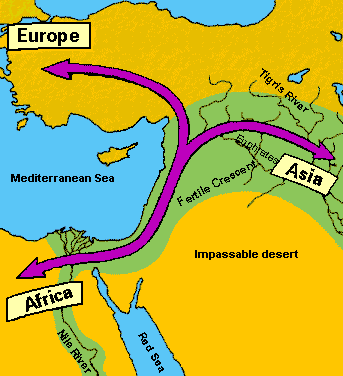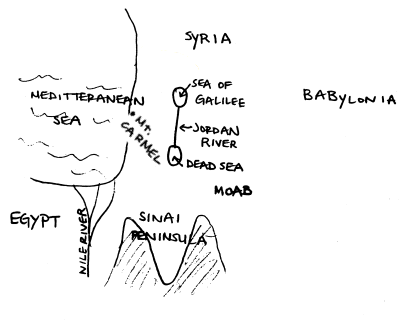
TL;DR:
Canaan’s location as a narrow land bridge between Africa, Asia, and Europe made it a strategic crossroads for trade, travel, and cultural exchange. God’s choice of Canaan as the Promised Land may have been intentional for global influence. Similarly, Jesus’ instruction for His followers to remain in Jerusalem for Pentecost may have been a strategic decision, using the city’s global festival audience to launch the Gospel to the world.

"This is Jerusalem: I have set her in the center of the nations, with countries all around her" -- Ezekiel 5:5, NIV
Why did God ask Abraham to uproot his family and move all the way to Canaan, a narrow ribbon of territory between the eastern shore of the Mediterranean and the Jordan River? Why did the Lord need him to move from one end of the Fertile Crescent to the other? The answer may be a simple one: strategy. Missiologists have long pointed to the strategic importance of that narrow piece of real estate that Christians today often call The Holy Land.
The Promised Land of Canaan -- inhabited by both Jews and Palestinians -- is only 60 miles wide in places. At its western edge is the Mediterranean Sea. To the east lies an impassable desert. Its location makes it a land bridge between three continents. Africa's only land link to Europe and Asia runs through what is today modern Israel. If God wanted to make Himself known throughout the ancient world, this would have been the ideal place to do it.
To establish and maintain a nation on this busy bridge would be a superhuman feat. But this is exactly what the seemingly puny little nation of Israel did (with some brief gaps) for nearly 1,300 years. Was it a mere coincidence that God placed His people on this bridge between continents? Unlikely. His selection of that area for His people put His name in "the center," as Ezekiel says so that His name could easily be proclaimed "among the nations," as passages in Isaiah 66 and Psalms 9 and 105 say.
More on God's instructions to Abraham to move to Canaan
Map idea taken from Bible Mapbook by Simon Jenkins, published by Lion Publishing, and reproduced by permission.
As a bridge between continents and empires, the land was a constant battleground down the centuries. Whoever controls Israel controls the land bridge between Europe, Africa, and Asia. The skinny little land bridge that was home to Israel and Judah knows the tramp of many a foreign foot as nations more powerful than they crisscrossed it en route to great power struggles elsewhere.
An understanding of Jewish history rests on appreciating how the location of the land of Israel, on a bridge between Africa and Asia, formed them in many ways. The "superpowers" of the period were Egypt, to Israel's southwest; Assyria and Babylonia, to Israel's northeast; and, later, Rome and Greece, to the northwest.
As the great powers battled each other through the centuries, they necessarily had to traverse the land bridge on which Israel was located. That means the history of the land of Israel is something like that of the Baltic states, caught between Germany and Russia. As the balance of power swung between those superpowers, conquering armies would march through the countries separating them, sometimes forcing local residents to adopt the culture of the conqueror. Likewise, Jewish history is a story of great powers, wars, invasions, revolts, and exiles.
Just before Jesus' ascension into Heaven, He told His close followers to stay in Jerusalem (Acts 1:4). Was that just to keep them together, or was it a strategic move?
Jerusalem wasn't home for most of them. Galilee was their home. They were outsiders in Jerusalem. Indeed, in the Acts 2 account of the Holy Spirit's coming on the day of Pentecost, people identified Jesus' followers as being from Galilee because of the accent in their speech.
So, why had Jesus told them to stay in Jerusalem? Could it have been because Jerusalem would be overrun by people from all over the Mediterranean during the celebration of Pentecost? What a global stage the city would be on which to proclaim the Good News. Having all Jesus' close followers in Jerusalem for that festival may well have been purposefully strategic.
On the first exam in Introduction to Biblical Literature, students may be asked to draw a map of the eastern Mediterranean by hand and indicate the location of several places. Check the study guide to see what the expectations (including locations to be marked) are for your particular class.
Maps will not be graded on either artistic quality or exactness to scale. Below is an example of what will meet the expectations. As you can see, it's not the most precise map ever drawn. However, it does indicate to me that the person drawing it would be able to point to all of the places on a professionally created map of that area of the world.

-- Howard Culbertson, hculbert@snu.edu
The Levant is a historical and geographical term referring to the area in the Eastern Mediterranean that today includes Israel, Palestine, Lebanon, Syria, Jordan, and sometimes parts of Turkey and Cyprus. The term "Levant" is derived from the French word "lever," meaning "to rise." The sun rises in the east, so the reference is to the area at the east end of the Mediterranean.
Geographically, the Levant serves as a bridge between the continents of Africa, Asia, and Europe. Its strategic location has made this area a vital crossroads for trade, culture, and migration throughout history. Due to its position, the Levant has been a meeting point for various civilizations and cultures.
The Levant has been home to ancient civilizations, including the Phoenicians, Canaanites, Israelites, and Assyrians, among others. Its location at the crossroads of continents made the Levant an area of constant interaction, conflict, and exchange.
In addition to Canaan the Levant, other names that have been given to all or part of this area include Judah, Samaria, Galilee, Beulah Land (from Isaiah 62:4), the Promised Land, the Land of Milk and Honey (Exodus 3:8), Bilad al-Sham (Arabic term meaning "the land of the north"), and Palestine or Palestina (a name the Romans gave to it when they were trying to erase all Jewishness from the area)
| How can I know what God expects of us? What is God's plan for the world? These questions and others are answered in the Old Testament. [ more ] |
C - Connection route for trade and travel,
A - Ancient land where ideas and people met,
N - Nestled at the heart of great empires,
A - Artery of cultural and commercial exchange.
A - A passage uniting Asia, Africa, and Europe,
N - Nexus of history, where civilizations bonded.
Like acrostics? Here are more of them